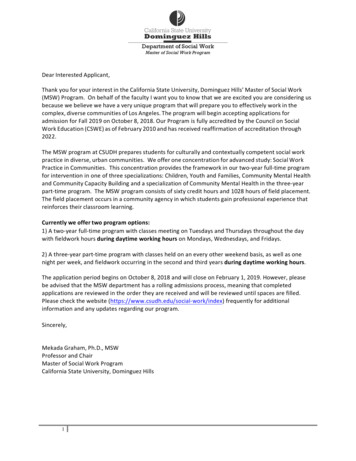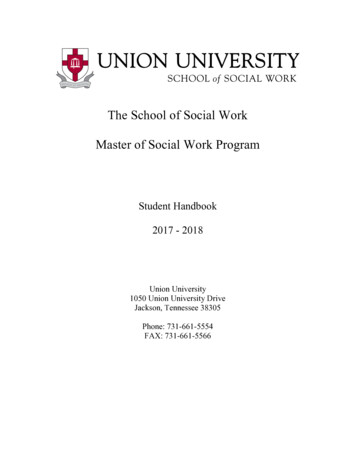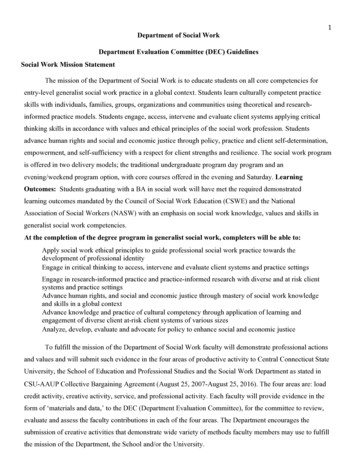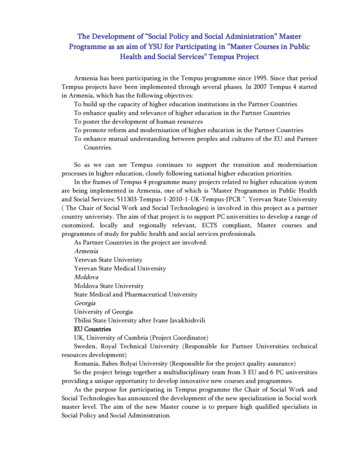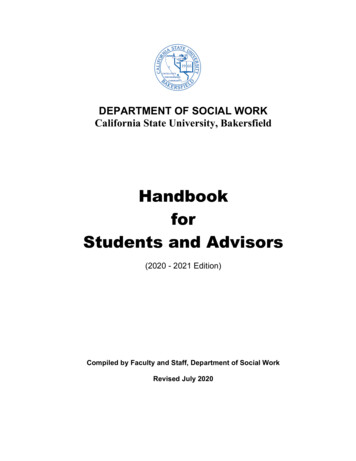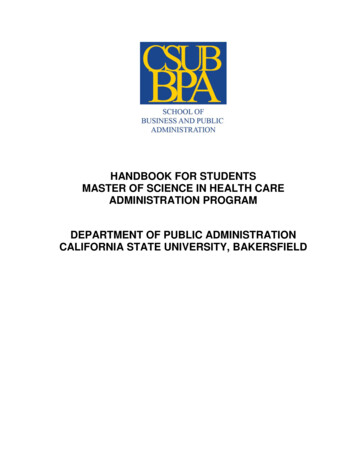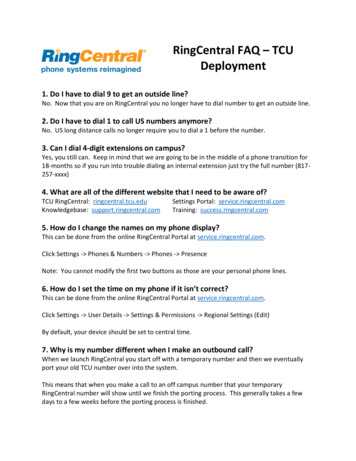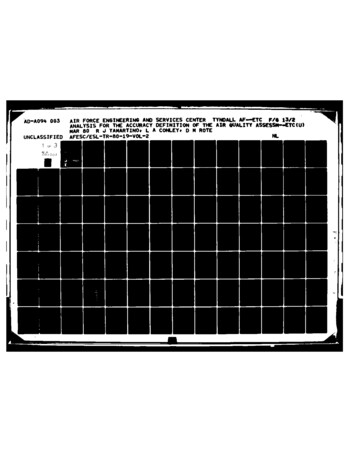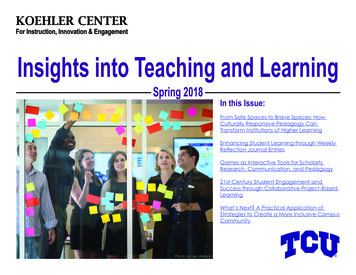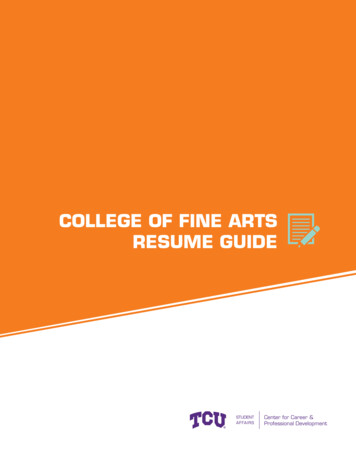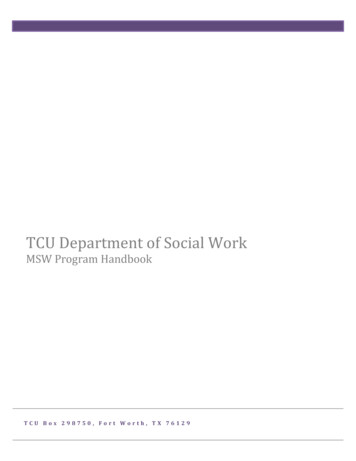
Transcription
TCU Department of Social WorkMSW Program HandbookTCU Box 298750, Fort Worth, TX 76129
Social Work MSW Program HandbookTable of ContentsDepartment of Social Work Contact InformationTCU MissionTCU VisionTCU Core ValuesHarris College Of Nursing and Health Sciences MissionDepartment of Social Work MissionDepartment Faculty and Staff Names and Contact InformationSECTION I: MSW POLICIESAcademic AdvisingAcademic Warning Status and TerminationAdmissions Committee and ProcessProcess for AdmissionFollow-up and Offer AcceptanceAdmission RequirementsTraditional StudentsAdvanced-Standing StudentsCourse CurriculumFoundation CurriculumFoundation Curriculum CoursesAdvanced CurriculumAdvanced Curriculum CoursesCourse Load RequirementsDirected Study CoursesElectivesField Hour CreditGoals of the MSW ProgramGrading PolicyGraduationLeave of AbsenceLicensure ExamMedical Withdrawal/Course Reduction/Retroactive WithdrawalPass/No-Credit Grading OptionStudent Participation in Program PolicyTermination from the MSW Program2
Term Limits for CompletionTransferring CoursesSection II: OTHER RESOURCESHarris College Academic Resource CenterTCU Career ServicesTCU LibrarySection III: APPENDIXMSW Program RequirementsNASW Code of EthicsTexas State Board of Social Work ExaminersNASW Standards for Cultural Competence in Social Work PracticeTCU Student Handbook3
TEXAS CHRISTIAN UNIVERSITYwww.tcu.eduDepartment of Social WorkHarris College of Nursing and Health SciencesWebsite: www.socialwork.tcu.eduMailing Address:TCU Box 298750Fort Worth, TX 76129The Department of Social Work has been committed to excellence in preparing generalist SocialWork practitioners since its inception in 1975. As the University has grown and modified itsmission, so has the Department. Both the University and the Department emphasize ethicalbehavior, life-long learning, service to the community, and the importance of a knowledge base.Social Work has long been viewed as the conscience of the University and as specifically applyingthe University mission in its educational process. The University values dignity, respect,inclusiveness, tolerance, and ethical leadership qualities consistent with Social Work values.The Master of Social Work Program mission is consistent with the Social Work profession’spurpose and values and the program’s context. The mission of the MSW Program to prepareethical and competent advanced social work practitioners who promote human rights andeconomic and social justice with diverse clients in the global communityTCU MissionTo educate individuals to think and act as ethical leaders and responsible citizens in the globalcommunity.TCU VisionTo create a world-class, values-centered university experience for our students.TCU Core ValuesTCU values academic achievement, personal freedom and integrity, the dignity and respect of theindividual, and a heritage of inclusiveness, tolerance and service.Harris College Of Nursing and Health Sciences MissionThe mission of the Harris College of Nursing and Health Sciences is to enhance the humancondition by preparing graduates who think and practice as ethical leaders, and by advancingknowledge of health and human development within the global community.Department of Social Work MissionTo prepare ethical and competent generalist and advanced social work practitioners who promotehuman rights and economic and social justice with diverse clients in a variety of settings in theglobal community.4
TCU DEPARTMENT OF SOCIAL WORKName/PositionSh’Niqua Alford, MSW, LCSWAssistant Professor of ProfessionalPracticeBSW Program DirectorSamantha Bates, Ph.D.Assistant ProfessorNada Elias-Lambert, Ph.D., LMSWMSW Program DirectorAssistant ProfessorD. Lynn Jackson, Ph.D., LCSW, ACSWDirector of Field EducationAssociate ProfessorAesha John, Ph.D., LMSWAssistant ProfessorKatie Lauve-Moon, Ph.D.Assistant ProfessorJames Petrovich, Ph.D., LMSWDepartment ChairAssociate ProfessorMary Twis, PhD, LMSW-APAssistant ProfessorTeaching InterestsField EducationAdvanced PracticeDirect Practice with Children &FamiliesChild WelfareMicro PracticeSocial Work with AdolescentsSchool Social WorkInterventions with Children andFamiliesSocial Work Practice withChildren/AdolescentsDiversity and Social JusticeResearchPolicyIntimate Partner ViolenceProfessional FoundationDiversityGroup PracticePolicyField EducationHuman Behavior in SocialEnvironment 1Social Work with Children andFamiliesDevelopmental DisabilitiesResearchPolicyCommunities & OrganizationsGender & InequalityMacro Practice & Social IssuesResearchHuman Behavior in the SocialEnvironment IIntroduction to Social WorkPoverty, Inequality, and SocialJusticeMacro PracticeMicro PracticeMental HealthCriminal Justice Systems andSocial WorkInterpersonal ViolenceResearch InterestsChild WelfareMental HealthPositive Youth DevelopmentSchool Social WorkFamily-School-CommunityPartnershipsSexual Violence PreventionBystander InterventionsProgram Design, Implementation,and EvaluationWomen’s IssuesSocial PolicyWellbeing of Individuals withIntellectual and DevelopmentalDisabilitiesAttachment and ParentingProgram EvaluationWork & GenderSociological Social WorkOrganizations & InequalityGender & ReligionHomelessnessHealth Service Use by PeopleExperiencing HomelessnessOrganizational Theory andAdministrationProgram Design and ImplementationCommunity-Based ResearchEvaluation Research MethodsHuman Trafficking,Domestic Minor Sex TraffickingHuman Trafficking Nonprofits andBest PracticeSexual Abuse5
Tee Tyler, Ph.D., LCSWAssistant ProfessorMicro Practice Methods (IND,FAM, GRP)Research MethodsDiversity & Social JusticeParent-LGBTQ Child RelationshipsSocial Work EducationInterprofessional EducationSocial Identity TransitioningSusan RahroviAdministrative AssistantRubi Orozco, M.Ed.Academic Program Specialist6
Section I: MSW PoliciesI.MSW POLICIESACADEMIC ADVISINGAcademic advising is an intentional process that involves a collaborative partnership between thestudent and the academic advisor. Successful advising is a shared responsibility that will equipstudents with knowledge and tools to make responsible decisions and to enable them to identifyand achieve their educational and career goals (Code of Student Conduct).Each student is assigned an academic advisor upon upon admission into the program. Advisorsare Social Work faculty and are responsible for overseeing student degree plans and beingaccessible to students regarding job opportunities, doctoral education, and professionalism. TheDepartment chair has primary responsibility for overall accountability of advising. Each student isexpected to meet with their academic advisor prior to the beginning of each semester. It isexpected that advising will be more in-depth in the advanced year when determining whichelectives and field placements will best advance the student’s career goals and aspirations upongraduation.Any student who is assigned a grade of I (incomplete), a grade of C or below, or who is placed onacademic warning status must contact their assigned advisor before registering for the followingsemester. Registration bars are placed on all MSW student records prior to each registrationperiod. Bars will be lifted only if students have satisfied all requirements to date.For students experiencing difficulties, faculty advisors refer them to appropriate resources insideor outside the university setting. University services most frequently used include the CounselingCenter, the Writing Center, the Health Center, and the Center for Academic Services. Social Workfaculty members limit their role of advising to those concerns relevant to the educational needs ofstudents. When students require or request ongoing professional counseling, faculty refer them toappropriate resources, both on and off campus.The Director of Field Education may also serve in an advisory function to students as they work todetermine which field placement locations best fit their educational and professional goals. TheDirector of Field Education will also work individually with each student entering their final fieldplacement to ensure that the field placement process, including preparing a professionalstatement and resume, is successful.ACADEMIC WARNING STATUS AND TERMINATIONIf a student’s overall grade-point average falls below 3.0, the student is placed on academicwarning status. While in warning status, the student may not drop any course or withdraw fromthe University without the approval of their academic advisor, MSW Program Director andDepartment Chair. In the next semester in which the student enrolls, the overall grade-pointaverage must be raised to 3.0 or the student is dismissed from further study.Certain circumstances make it possible for a student to be dismissed from continuation in theMSW program. All students receiving a grade of C or below or an I (incomplete) in any semester7
will have their academic progress in the program reviewed in a joint meeting of their academicadvisor and the program director. Students will be notified in writing of adverse decisionsregarding their continuation in the program. Students may appeal in writing to the programdirector for continuation in the program.Additionally, faculty may identify, in writing, those students who demonstrate behaviors that raiseserious questions about their continuing towards the professional degree in Social Work. Suchstudents' names will be submitted to the program director who will coordinate a review, includingappropriate faculty members in such a process.Students conditionally admitted by the University and MSW program will be notified of theseconditions at the time of admission. If the conditions placed on admission have not been fulfilledwithin the time specified, the student may be dismissed from subsequent registration.ADMISSIONS COMMITTEE & PROCESSComposition of Admissions CommitteeThe MSW Program Admissions Committee will consist of four members including:1. MSW Program Director2. Admissions Coordinator3. One MSW faculty member4. One other faculty member from the Department of Social WorkPositions on this committee may rotate as faculty composition of the department changes. Theprogram’s MSW Admissions Coordinator will coordinate all efforts with the Harris College ofGraduate Studies. The MSW Admissions Coordinator is responsible for the initial eligibilityscreening of all applicants.Process for AdmissionThere is a four-stage process for admissions to the MSW Program:1. Eligibility Reviewa. Application goes to the Harris College of Graduate Studies for initial review and iscleared for a prior degree from accredited institution and GPA.b. MSW Admissions Coordinator reviews the application to determine if basiceligibility is met and indicates if the applicant has any unique characteristics.2. Preliminary Considerationa. The MSW Admissions Committee reviews applications and assesses them accordingto the MSW Program Application Review Scoring Rubric.b. Applicants are separated into one of three categories:i. Exceeds required qualifications/criteriaii. Meets required qualifications/criteriaiii. Does not meet required qualifications/criteriac. Those placed in the “Exceeds” or “Meets” categories will be included for finalconsideration.8
3. Final Decisionsa. The MSW Admissions Committee reviews those in the top and middle tiers.b. The MSW Admissions Committee and MSW Admissions Coordinator will makeadmissions recommendations for the top candidates. The MSW AdmissionsCoordinator will send letters of acceptance to those accepted into the MSWProgram. A second tier of applicants will be maintained as a wait list and will benotified as such. Additional applications may be accepted if there is space availablein the program.4. Conditional acceptance for those who need to complete pre-requisitesFollow-Up and Offer AcceptanceStudents accepting an offer of admission will notify the Department of Social Work and thestudents will then receive additional information about registration and other University-wideissues (financial aid, assistantships, etc.). Accepted MSW students must pay a 300 nonrefundable deposit to secure their seat in the program for the upcoming academic year.The MSW Admissions Coordinator and MSW Program Director will provide any additionalmaterials needed by students, such as a field placement questionnaire, required readings, etc. Ifneeded, students admitted to the program may submit documentation for transfer creditconsideration (see Transferring Credit).A student orientation meeting will be held with all new graduate students before classes begin inthe fall semester. Orientation is mandatory and all students accepted into the MSW program areexpected to attend.ADMISSION REQUIREMENTSThe admissions policy and procedures are designed to ensure that graduate students entering theMSW Program are committed to upholding the values, ethics, and principles of the social workprofession and are committed to the mission of the MSW Program. The admission criteria andselection process are designed to ensure that students possess the academic abilities andmotivation, and in the case of the Advanced Standing option, requisite knowledge and credentialsto be successful in the MSW Program.In addition to meeting the general admission requirements of TCU and the Harris College Office ofGraduate Studies, applicants must meet the admission requirements of the Traditional (2-year) orAdvanced Standing (1-year) MSW program. Applicants may be reviewed for entry into either ofthe programs.Admission decisions will be based on a wide range of information, including the stipulatedqualifications described below. Admission to the program presumes the ability and willingness tofollow the sequential curriculum structure.Traditional Program StudentsTraditional students are considered those who will complete 60 credit hours to graduate withtheir MSW from TCU. Traditional students should expect to complete the program in two years.9
Required qualifications for admission:1. Prior Degree: Students accepted for the MSW Program must have completed abaccalaureate (e.g. BA, BS) degree from an accredited college or university.2. GPA: Applicants should have strong academic preparation as demonstrated by anundergraduate GPA of at least 3.00 (on a 4.00 scale) in the last 60 hours of coursework.3. Course Prerequisites: Applicants must have one college-level course in each of the following:statistics, sociology, and psychology before registering for the first semester in the MSWProgram.4. References: Applicants must submit three letters of recommendation from individuals whocan address the applicant’s academic abilities and interpersonal skills, potential forgraduate education and potential for professional social work practice. It is required that atleast one reference be an academic reference from an academic advisor or instructor.5. Professional Statement: Applicants must submit a well-written professional statement (750to 1500-word max) that addresses the following:a. What motivated you to decide to pursue an MSW?b. How do your personal values connect with the values of the social work profession?c. What are strengths and weaknesses that will impact the student as a social worker?d. Describe any experiences and leadership opportunities that will contribute tosuccess in this graduate program?e. Discuss any significant volunteer and/or work experiences related to social work.f. What are your professional goals and plans in social work?g. Please share two TCU Department of Social Work faculty members you would beinterested in engaging with during your time in the TCU MSW program. Please visitthe Department of Social Work website for more information about social workfaculty.h. Optional: We value diversity, equity, and inclusion in the TCU MSW program andwill use this information to better serve our students in the MSW program, but itwill not be used to make admissions decisions. If you’d like to share a perspectiveyou bring or experiences you’ve had to help us understand you better—perhapsrelated to a community you belong to, your sexual orientation or gender identity, oryour family or cultural background—we encourage you to do so.6. Resume: Applicants must submit a current resume or vitae with their application.Petition for Academic Exception:MUST be completed by the applicants whose Undergraduate GPA is below 3.0.An applicant who believes that his or her individual circumstances warrant consideration for awaiver of the minimum university admissions requirement of an undergraduate GPA of 3.0 mustpetition the MSW admissions committee.The request should be a one-page statement entitled “Petition for Academic Exception”. Thepetition should include a statement indicating how not meeting the minimum admissionsrequirement of a 3.0 GPA should be waived, as it does not adequately represent the applicant’scapabilities. The applicant should briefly discuss how he or she has demonstrated a capacity for10
successful achievement in a rigorous graduate program. For example, an applicant might provideevidence of: Superior grades during the final 60 hours of undergraduate coursework indicating a trendtoward improved performance; Competence through achievement in another graduate program; Outstanding work experience in human services (volunteer or paid).The applicant should also discuss if granted admission to the program, how he or she plans toaddress obstacles to successfully complete the program (for example, if a low grade point averagewas viewed as the result of a “needing to work full time during my undergraduate studies” theapplicant should discuss why that is not likely to be a factor during his or her graduate study).Petitions must be uploaded along with all other application documents.Advanced Standing StudentsAdvanced Standing students are students who have earned a BSW from an accredited BSWprogram within seven (7) years and will complete 30 credit hours to graduate with their MSWfrom TCU. Advanced standing students should expect to complete the program in one year.Required qualifications for admission:7. Prior Degree: Applicants must hold a Bachelor’s Degree in Social Work (BSW, BSSW) orother Bachelor’s degree (BS or BA) with a major in social work from a CSWE accreditedprogram at the time of enrollment.8. GPA: Applicants should have strong academic preparation as demonstrated by anundergraduate GPA of at least 3.00 (on a 4.00 scale) in the last 60 hours of coursework.9. Course Prerequisites: Applicants must have one college-level course in statistics prior toregistering for the first semester in the MSW program.10. References: Applicants must submit three letters of recommendation from individuals whocan address the applicant’s academic abilities and interpersonal skills, potential for graduateeducation and potential for professional social work practice. It is required that at least onereference be an academic reference from an academic advisor or instructor and that one ofthese references be from a field instructor.11. Professional Statement: Applicants must submit a well-written professional statement (750to 1500-word max) that addresses the following:a. What motivated you to decide to pursue an MSW?b. How do personal values connect with the values of the social work profession?c. What are strengths and weaknesses that will impact the student as a social worker?d. Describe any experiences and leadership opportunities that will contribute tosuccess in this graduate program?e. Discuss any significant volunteer and/or work experiences related to social work.f. What are your professional goals and plans in social work?g. Please share two TCU Department of Social Work faculty members you would beinterested in engaging with during your time in the TCU MSW program. Please visitthe Department of Social Work website for more information about social workfaculty.11
h. Optional: We value diversity, equity, and inclusion in the TCU MSW
TEXAS CHRISTIAN UNIVERSITY www.tcu.edu Department of Social Work Harris College of Nursing and Health Sciences Website: www.socialwork.tcu.edu Mailing Address: TCU Box 298750 Fort Worth, TX 76129 The Department of Social Work has been committed to excellence in preparing generali
